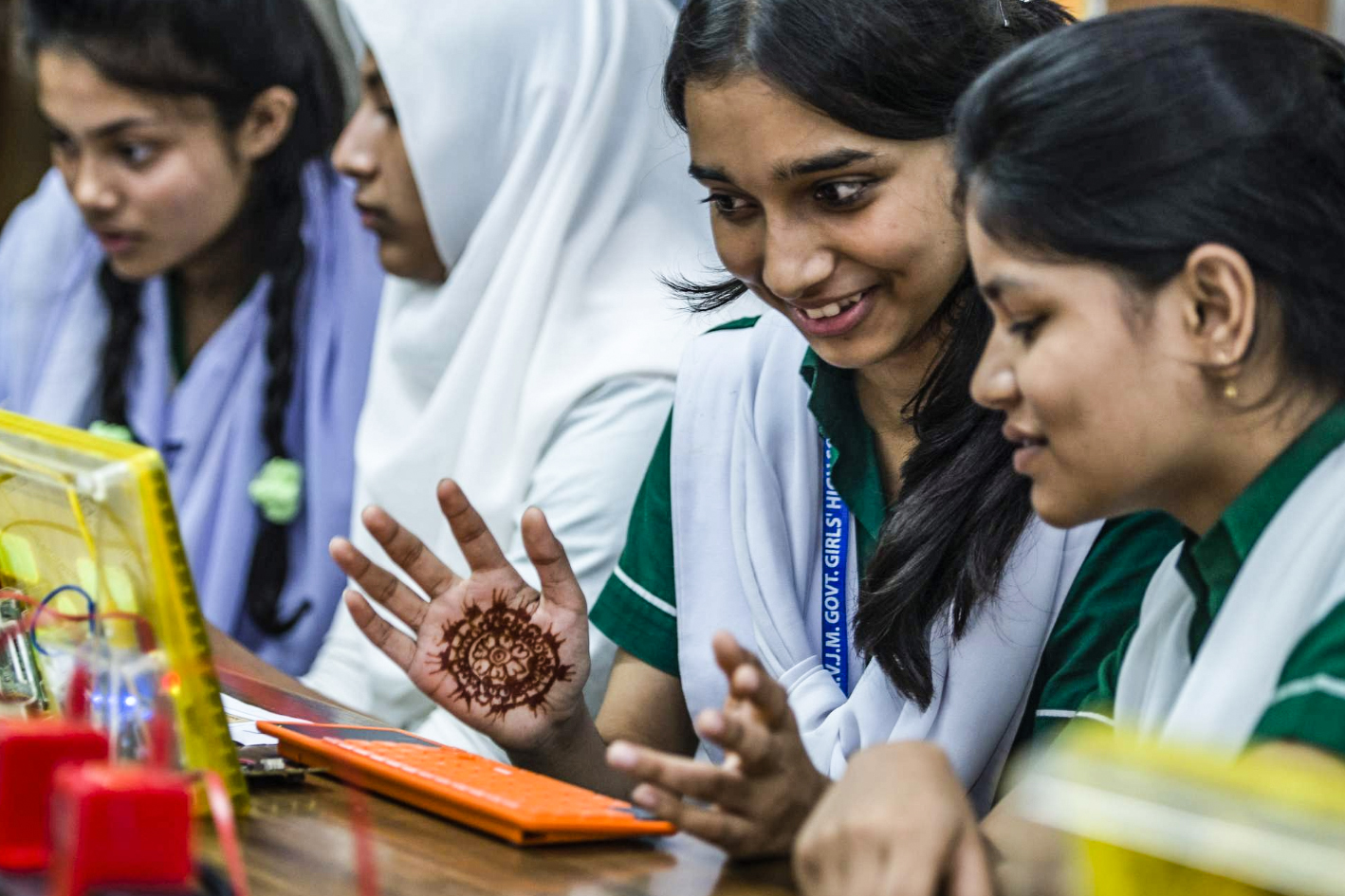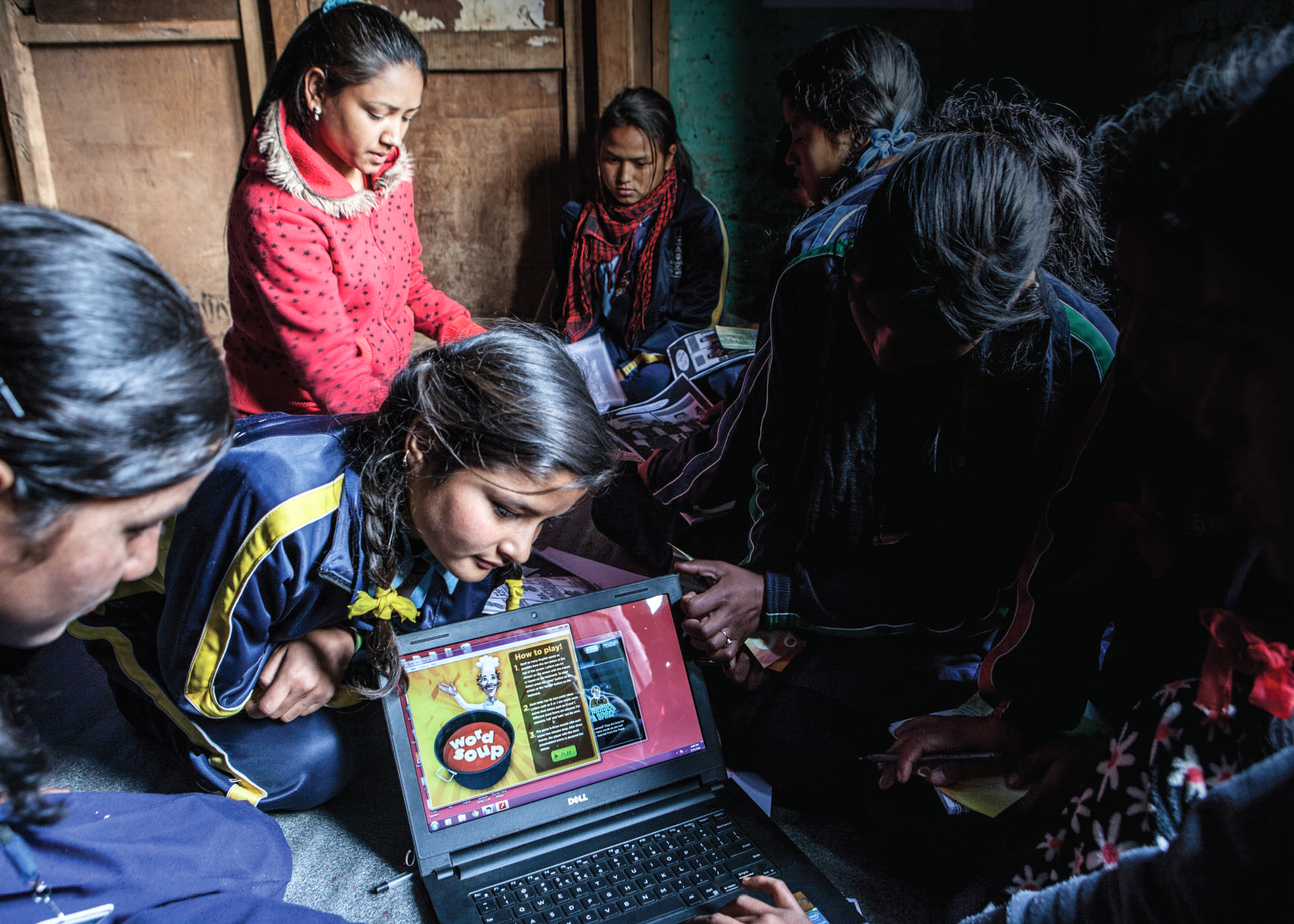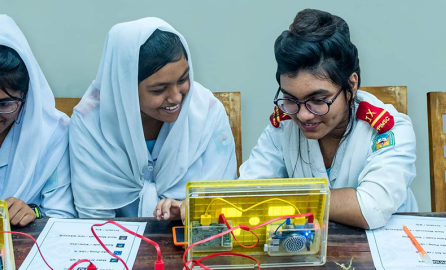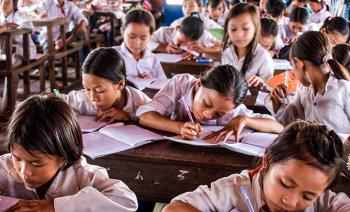Since 2012, the British Council’s EDGE programme has trained 16,000 girls from marginalised communities in Bangladesh, India and Nepal, helping them steer their own future.
“Before joining this club, I didn’t understand how I could fulfil my dream, but now I am very happy I can fulfil it,” said Julie Renat Runa, a participant at an EDGE club in Bangladesh.
An alternative
The EDGE (English and Digital for Girls Education) programme was launched in 2012 by the British Council in partnership with BRAC, a development NGO based in Bangladesh. Since then it has expanded to India and Nepal, with plans for expansion to Afghanistan and Pakistan this year.
The programme’s aim is to increase voice and agency and thereby provide opportunities for many girls whose only other prospect may be marriage. In Bangladesh, for instance, where the legal minimum age for women to marry is 18, 18% of girls are married by the age of 15, according to UNICEF.
The assumption that marriage is girls’ usual option is evidenced in UNESCO figures showing how huge gender disparities in secondary education, employment levels, and political participation stifle female potential in Bangladesh – but also India and Nepal.
Asia has the reputation as a world leader in digital expertise, despite Bangladesh's struggle with the digital divide among children (see infographic "The digital divide in Bangladesh").
Mohammed Abdullah Hil Baki, from BRAC, explained that Bangladeshi government’s policy is to promote “Digital Bangladesh”, so it “comes as irony” that families do not consider IT training suitable for their daughters.
“Bangladesh is a country of 64 districts, and we have many villages,” he said. “In urban areas, we have some opportunities for the girls to learn English, but in rural areas, we have marginal results. The girls have limited access to learning English, ICT and digital skills.”
To give girls a better chance in life, the British Council’s EDGE programme is tackling girls’ lack of English and digital knowledge.
The programme works through local partners, using their networks to reach marginalised areas: partnerships that began with BRAC in Bangladesh in 2012, expanded to India and Nepal with the support of local organisations Naandi Foundation and VSO, respectively.

In Bangladesh, 18% of girls are married by the age of 15. The EDGE programme aims to change that by giving them a higher chance of staying in school. Photo © British Council
Safe space
Often adolescence in South Asian countries is the time girls see their brothers’ horizons broadening outside the home, while their own are closing.
Helga Stellmacher, British Council’s South Asia Regional English Director, explained how EDGE’s community clubs operate as “safe spaces” that give the girls the confidence to fully participate – which doesn't alway happen in their formal schooling.
Helga Stellmacher explains EDGE’s approach:
With parental approval, here girls can come together to discover themselves, discuss their futures, learn new skills, and perhaps most importantly, build self-confidence.
The venues are also carefully designed to appeal to the girls and their parents, with separate washrooms, for instance, that provide increased privacy. This is crucial because household bathrooms in many areas of Bangladesh can be shared between as many as 20 families, said Stellmacher.
With EDGE’s “light touch” approach, the girls learn through team exercises led by peer leaders, who are often their own age and act as influential role models. The atmosphere is relaxed – which is key, said Stellmacher.
For Baki, meanwhile, another important aspect is to make the teaching fun. “Not like the normal school,” he said. “In country like Bangladesh, many girls feel shy because they cannot speak English or use a tablet, compared to their peers. Our approach helps them gain confidence to go ahead.”
Mohammed Abdullah Hil Baki explains the informal structure of the EDGE programme:
The clubs can only operate with parental and community support, so EDGE and the NGO partners on the ground work to involve them as much as possible.
Baki said he’s seen how both the girls and the local community play an important role in persuading parents that the girls should have a chance of pursuing higher education. In some cases, parents have talked to other parents about how EDGE has benefitted their daughters.
What have been the main challenges?
For Baki, the most immediate difficulty has been the lack of digital connectivity and software expertise in rural areas. Fortunately, he said, the clubs have been able to draw on local support to solve this.
Both Baki and Stellmacher mentioned the need for funding, and Baki felt donors should come and see the results for themselves.

Lack of digital connectivity and software expertise in rural areas remains a key challenge, said Mohammed Abdullah Hil Baki. Photo © British Council
Stellmacher said they were looking at how the NGOs could access big funders like the Malala Fund to contribute to scaling up. One of the major costs is the purchase of computer hardware.
One of EDGE’s greatest successes has been the confidence gained by the participants. Since 2012, the programme has trained 16,000 girls across the three countries.
Mohammed Abdullah Hil Baki on the empowerment of girls in their local communities:
Some of these girls have been able to use their agency to persuade their parents to let them continue on to secondary or higher education. Others have stimulated debates in their communities about womens’ role.
How can the success be replicated?
According to Stellmacher, the programme is expected to launch in Pakistan and Afghanistan later this year. Both countries have similar gender and digital divides, and the British Council is working on how to strengthen links with livelihood opportunities for the girls.
Following research conducted into what it calls realistic livelihood opportunities for girls in these contexts, the British Council is further exploring areas such as introduction of open-source hardware Micro:bit, certification of digital skills, career counselling, social action projects for the girls. The organisation is also looking into how to weave social enterprise into the final phase of the programme.
But while both Stellmacher and Baki want to scale up EDGE with new features, they don’t want to lose its core elements, because, according to Baki, “small is beautiful”.
This article is part of a thematic series on education and development.
This article was written by Daphne Davis. Photo © British Council






Comments
Log in with your EU Login account to post or comment on the platform.